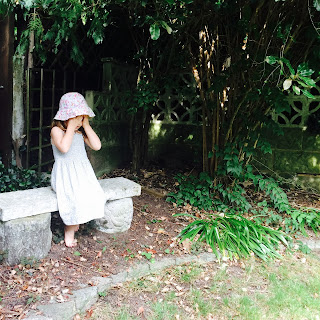All the kids use the garden all year round, but right now it's more important than ever. We are so fortunate to have this space while the country is on lockdown, but it's not always easy for our family to get out into it. Autistic and many other kids can need to regulate their sensory systems - how their body reacts to the world around them. And the garden has to help them with this.
Sometimes it can be a challenge for us to tear the kids away from the comforts they seek inside. I'm all for the kids doing whatever works for them, but we have limited space and with everyone stuck in the house we need to use the space we have to help everyone stay calm.
So I can make being outside more enticing. The time spent in the garden can be more beneficial and educational for them by fulfilling their sensory needs, whether they are sensory seekers (having a desire to seek out touch, light, smells or movement) or the exact opposite (shying away from the same). Here's some of the things we do:
When our kids are Sensory Seekers
- Engaging their sensory systems can be challenging but our mini festival last year was a hit because the kids could engage their sensory systems by listening to music, watching and playing with flags and even having outside picnic food. Sometimes because it's a different place the kids will eat something different. Most of the time though it's just the same food in the garden! Our autism kids do love routine.
- We get them moving about with a trampoline - like many autistic and ADHD kids ours love to bounce, but Jane also joins in too. They get lots of use out of the climbing wall on our climbing frame which is really good for their motor skills development. And our hammock under the frame doubles as a swing.
- We encourage them to run through, yes I said through, the border bushes and plants as it adds to their feeling and the sensory seeker loves running around the grass bare foot too. Just make sure you keep stones and other hard or gooey things away so save their feet getting hurt.
- Picking and nibbling on fresh berries, which is a great way to get some fruit into their diet, but make sure there is nothing in your garden that could make them really sick or anything too spiky.
- Growing plants can also be a great learning activity for seekers. Our boys find being 'gentle' really difficult, so Jane shows them how to be gentle around plants. It may be a good idea to plant and collect some fruit and veg from the garden. It's an opportunity to learn about being gentle and caring. Not always easy, but it's a start. If nothing else the promise of water play with the hose after watering the plants is often popular. Tomato plants are particularly popular here.
When our kids need to hide or be calm
- Provide a comfy spot to sit and relax; more people will be encouraged to enjoy the garden on a regular basis if they have somewhere they can go. We have places in our small garden for the kids to hide - close themselves off when they are overwhelmed. A bench hidden in the trees blocks out bright lights, sounds and wind. We've also set up a play area under our climbing frame with old tiny tyres tied together for seats which is great for those seeking sensory solace. Simply bringing out cushions from the living area can help kids feel at ease outside. Our hammock can be great to place to hide away too.
- Providing soothing scents for the kids can be really relaxing. All our kids find sweet smells comforting and have a great sense of smell. Lavender can be particularly lovely along with other sweet smelling flowers and fruit trees also help them to relax and enjoy the garden.
- Providing the right clothes means they can access the garden more often. Sometimes they feel too much. One day it's about getting all the senses engaged and others it's about closing them off. If the grass is wet in the morning, David will sometimes not go further than the patio, so a pair of crocs or other shoes nearby means he will venture out and a light raincoat that goes under his bottom means he can go on a wet swing without an upset.
What ideas do you have for sensory kids in the garden?





No comments:
Post a Comment
I read all your comments and appreciate you sharing your thoughts with me and our readers. I welcome any feedback on my posts and you can always contact me directly. Thank you.